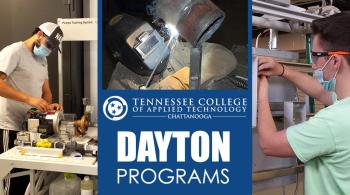Chattanooga State Programs Bring Opportunities to Rhea County Area
April 9, 2021 | Betty A. Proctor | Press Release

When Nokian Tyres announced plans for their new $360M manufacturing facility in Rhea County, Chattanooga State Community College leadership met with area leaders to develop plans for the expansion of two Chattanooga State Tennessee College of Applied Technology (TCAT) programs into Rhea County: Industrial Maintenance Mechatronics (IMM) and Industrial Electricity (IE).
“Chattanooga State’s growing presence in Rhea County will be an avenue for us to continue to develop our current workforce and also develop a pipeline of future talent,” said Nokian Tyres Dayton Factory Human Resources Manager Blake Markham. “We are excited about the possibility of working with Chattanooga State.”
An Appalachian Regional Commission (ARC) grant awarded to Chattanooga State in July last year along with a grant from the Tennessee Board of Regents (TBR) provided the necessary funding to purchase the training equipment in support of these programs. Following the installation of equipment in the fall, both programs premiered in January for the spring 2021 semester. “Everyone is excited about the new programs,” stated Melvin Rhodes, IMM associate instructor. “Students are looking forward to the opportunities they will have for their future career advancement.”
The Industrial Maintenance Mechatronics program enters the Rhea County area with a solid 100% job placement rate established through the main campus program. According to the Bureau of Labor Statistics (BLS), the expected growth rate of 13% with approximately 70,000 more positions available through 2029 means good news for area residents interested in this growing career. “I like the electrical part the most, but Melvin (Mr. Rhodes) is the best part of this course,” said Jonah Gardenhire, IMM student. “I enjoy the way our instructor explains the labs,” added fellow classmate, Ryan Whymer.
Nokian’s Dayton facility employs approximately 240 workers and is currently engaged in a hiring campaign to add nearly 150 members to its team.
David Burgess, IMM department head, said that employers should expect our Industrial maintenance mechatronics graduates to be entry-level employees with a solid foundation of electrical and mechanical fundamentals, which include mechanical systems, electrical systems, hydraulics pneumatics, motor controls, basic PLC, and basics of automation, robotics, and welding. “Students are expected to show commitment and a willingness to learn their industry with a stronger work ethic than those without training,” he stated.
By establishing this career pipeline to support local manufacturing industries, it will increase post-secondary students’ access to advanced training and completion of industry-recognized certifications, while creating a pipeline of highly trained workers to meet current and future workforce demands.
Mr. Rhodes also teaches Chattanooga State’s Industrial Electricity (IE) program in Dayton. With a 96% job placement rate, a career in Industrial Electricity has an expected growth rate of 8% with approximately 62,000 more positions available through 2029, according to BLS. He feels strongly that both programs will outgrow the current facility in the future. “With the growth of this community and the new industry expansion, these programs will be high demand,” stated Rhodes.
Graduates of the IE program will be prepared for entry-level positions having obtained a solid foundation in electrical fundamentals with skills that include AC/DC electrical systems, residential wiring and construction wiring practice, and simple motor control circuits with proficiency in electrical codes.
More than 90 graduates have completed Chattanooga State’s Welding program in Dayton since its opening in 2011. Graduates are able to perform basic welding techniques and execute other aspects of welding such as basic oxyacetylene cutting, shielded metal arc (SMAW), gas metal arc (GMAW), fluxcore arc (FCAW), and gas tungsten arc (GTAW), while displaying proficiency with hand tools used in the welding process. Talion Johnson, associate instructor, explains that students attend classes totaling 1290 clock hours over three semesters. “The program is fun and interesting, and faculty make the class easy to get the hang of and learn,” commented Austin Bradley, welding student.
Chattanooga State’s Industrial Maintenance Mechatronics and Industrial Electricity programs are both held at the Rhea Modular Labs located 0.5 miles from the entrance to the North American Factory at Nokian Tyres, at 320 Greenway Blvd, while the College welding program is located at 504 Broadway. Both facilities are in Dayton, Tennessee.
For more information about these programs, visit chattanoogastate.edu/tcat, stop by the Dayton Site at 200 4th Avenue or call (423) 365-5010.
